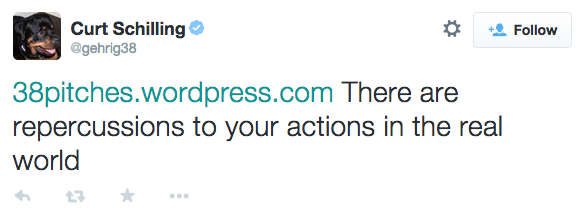Ad Disclosure
People Said the Grossest Stuff about Curt Schilling’s Daughter on Twitter and He’s so Mad
By Jim Adair
Published:
Curt Schilling has made some Twitter gaffes in the past, but he recently found himself writing a 1,700 word essay on his blog because he made the mortal mistake of just mentioning his daughter. [Editor’s note: Never mention your daughter on the Internet, sports people. We’re all 12.]
Last week, Schilling tweeted “Congrats to Gabby Schilling who will pitch for the Salve Regina Seahawks next year!!” as a proud father giving congrats to his daughter for playing college softball. It’s what dads do. But he learned one hard and fast rule of the Internet that day: It’s full of horrifically gross people who will do and say whatever just to entertain themselves. It’s a necessary utility for many, and a gross weirdo dungeon for others. But we love it, and so do our commenters.
Anyway, Schilling was inundated with tons and tons and tons of super gross, threatening, and weird Tweets about his daughter. From comparing a bloody sock to a bloody rhymes with sock, to … well, a lot of them referenced the bloody sock. But yeah, not kind words. Schilling, never one to stay silent (for better or worse), penned an essay on his blog about the whole thing:
And tweets with the word rape, bloody underwear and pretty much every other vulgar and defiling word you could likely fathom began to follow … I stopped because the rest was more of the same. And while these, to me as a dad, are just stupid and vile in ways you can’t fathom, they aren’t alone.
The real world has consequences when you do and say things about others. We’re at a point now where you better be sure who you’re going after.
If I was a deranged protective dad I could have been face to face with any of these people in less than 4 hours. I know every one of their names, their parents, where they go to school, what they do, what team they are on, their positions, stats, all of it. I had to do almost nothing to get ANY of that information because it is all public.
What part of talking about a young woman, my daughter or not, makes you even consider the possibility that this is either funny or makes you tough?
I found it rather funny at how quickly tone changed when I heard via email from a few athletes who’d been suspended by their coaches. Gone was the tough guy tweeter, replaced by the “I’m so sorry apology used by those only sorry because they got caught.
Schilling is furious. And rightfully so. It’s not just his daughter who gets treated like this either, and Schilling (I can’t belive I’m saying this) handles that reasonably. He links to a few stories where cyber-bullying led to suicide, and notices something about the people tweeting these things:
These aren’t thugs, tough guys or bad asses, these aren’t kids who’ve had it rough, they aren’t homeless or orphans, these are pretty much ALL white, affluent, college attending children, and I mean children.
Over on his blog, Schilling called out specific tweeters by name (and occupation), and asked for help figuring out who some others were. Some people reading this may be saying to themselves, “Well, what about comment sections?” And sure, I get you. But it’s a different issue. Comments sections (specifically ones that look like ours) are easily ignored and wholly anonymous. On Twitter, where you’re anonymous but only if you strive to be, you can reach your gross threats right into a person’s inbox.
The Internet, like most real-life places, is safer for men than it is for women. And when Schilling got all of this thrown in his face just for mentioning his daughter’s name, he saw it first hand. I don’t agree with Curt Schilling on much (read: anything), but he’s spot on here. Unfortunately, many of the threatened, harassed, and abused don’t have famous people to back them up. Schilling did good work here though.
When he's not writing about sports here or ranting about them on Twitter, Jim is probably watching X-Files on Netflix or drinking a beer somewhere. Jim has nothing against hockey, it's just not his style. He once met Duce Staley at a Sixers game.
